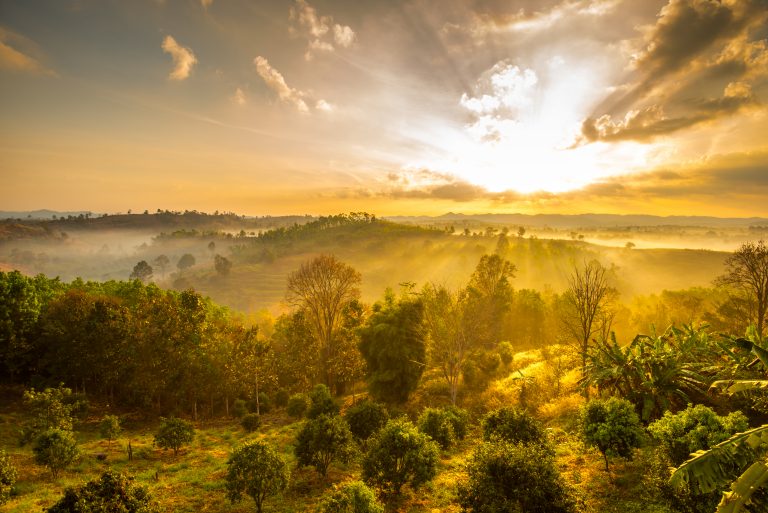By Benjamin Wiker

“The relationship between individuals or the community and the environment ultimately stems from their relationship with God.” —Pope Benedict XVI
A less provocative title might have been, “Why Catholics Need to Be at the Forefront of the Environmental Movement,” but that probably wouldn’t have caught your eye. So, now that I’ve got your attention, let’s make the case for a Catholic Ecology.
One of the questions I’ve been getting from Catholics in interviews has been something like this: “Well, the environmentalists are all for hugging trees, but they also push abortion. Shouldn’t saving babies be our first priority?”
My answer is this: “If you want to save babies, you’d better start hugging trees.” Here’s why.
The Left is very concerned with the degradation of the environment, and rightly so. For various reasons too complicated for me to go into here, they are also passionate partisans of the sexual revolution, hence their affirmation of homosexuality, gay marriage, and abortion.
All this is well known. Those on the Left are caught in an interesting kind of contradiction. They radically affirm the natural in nature, but just as radically reject any notion that there are natural moral limits that define our human sexuality.
Unfortunately, the response by many Christians is to affirm the opposite contradiction. So, Christians end up saying something like, “All those who are so hyped up about environmentalism are also rabidly pro-abortion and pro-gay marriage, therefore their concern about the natural environment must be essentially corrupt too.” Christians thus think it a matter of principle to reject concern for the environment as morally tainted, thinking that we have two mutually exclusive choices: either hug babies or hug trees.
But that causes an equally unhelpful reaction by the Left. The Left looks at this response by Christians and thinks, “All those who are so hyped up about abortion and homosexuality are also rabidly destroying not just the beauty of our natural environment, but poisoning the water and land as well, therefore their concern about ‘morality’ must be essentially corrupt too.”
The devil couldn’t have created a more irrational impasse, that’s why I’m inclined to credit him. This back-and-forth-but-getting-nowhere stalemate ensures that environmental and moral progress are both thwarted by deadlock—a condition Pope Francis in his environmental encyclical Laudato si’ called our “constant schizophrenia” (Section 118).
How about a different strategy on our part? What if Catholics were in the forefront of the environmental movement? What effect might that have on those on the Left?
They very well might begin to say something like this: “All those Catholics who are so hyped up about abortion and homosexuality are also passionately concerned with protecting the beauty of our natural environment, cleaning up the water and the land—therefore their concern about “morality” might just have something to it.
When I throw this possibility out to Catholics, they say, “But they are tree-huggers. That is, they actually seem to worship nature, and that is heretical! What about that!?”
My response is that we need to distinguish between hugging trees and worshipping them, between a deep respect and wonder at the glories of God’s creation and the age-old temptation to worship creation rather than the Creator.
But there is another age-old temptation, and that is to regard nature as evil, and therefore, to treat it with contempt. I don’t think the best way for us to avoid idolatry is to become Manicheans.
If Catholics are truly worried about the potential idolatry of tree-huggers, then we ought to be in the forefront of the environmental movement so that we can provide a creditable and clear witness to those who are confused. Our presence will help to remove extremism, as well as redirect the misplaced desire to worship from nature to the Author of nature.
In short, we Catholics can show them what it means to have a Catholic Ecology, one that affirms the beauty and integrity of nature and human nature. After all, nature is creation; a proper concern for the environment is part of the gratitude we owe to our Creator. That is as orthodox as it gets.
But it also allows us to make a point to the Left in terms that, given their concern for the environment, could lead them to where they need to go morally. They might begin to understand that just as there is an order of nature, which is good, wonderful, and beautiful, that we should both respect and protect, so also there is an order of human nature, which is good, wonderful, and beautiful, and we should respect and protect that too.
Originally published June 21, 2017.
© 2017 EWTN News, Inc. Reprinted with permission from the National Catholic Register.
Benjamin Wiker is the author of In Defense of Nature: The Catholic Unity of Environmental, Economic, and Moral Ecology. Read it now to learn more about how we can respect both nature and human life.

